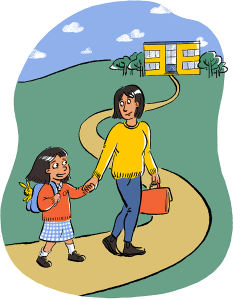 The early years foundation stage (EYFS) sets standards for the learning, development and care of children from birth to 5 years old. All schools and Ofsted-registered early years providers must follow the EYFS, including preschools, nurseries and school reception classes. You can read more about the EYFS Framework here: EYFS Statutory Framework (DfE, 2023)
The early years foundation stage (EYFS) sets standards for the learning, development and care of children from birth to 5 years old. All schools and Ofsted-registered early years providers must follow the EYFS, including preschools, nurseries and school reception classes. You can read more about the EYFS Framework here: EYFS Statutory Framework (DfE, 2023)
Early Years Foundation Stage (EYFS)
 Welcome!
Welcome!
Welcome to the wonderful world of Early Years Foundation Stage (EYFS) at Crakehall Church of England Primary School.
EYFS follows a different framework to the rest of the school, and our children learn in different ways that reflect their age, needs and interests. Vocabulary connected to EYFS can be confusing, so we hope this page helps to demystify EYFS as well as describe what makes EYFS at our school unique.
To find out more click on each headline.
Our Early Years Foundation Stage Policy can accessed here.
What is EYFS
Who works in EYFS?
We are lucky to have a dedicated, experienced, and enthusiastic EYFS team, who work together to ensure the best possible outcomes for all our children. Our passionate team believe that every child deserves the best possible start in life and work hard to support each child to fulfil their potential. We meet regularly to invest in our professional development and share ideas about how we can improve our provision and practice – to us, Early Years is more than just a job, it’s a lifestyle!
Miss Burnside |
Mrs Hunter |
Mrs McCafferty |
Mrs White |
Mrs Shepherd |
 |
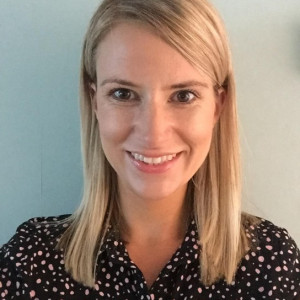 |
 |
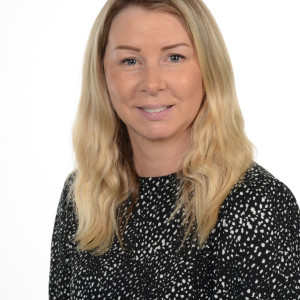 |
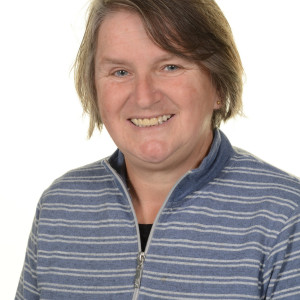 |
| Class Teacher | Class Teacher | General Teaching Assistant | General Teaching Assistant | Forest School Lead |
Our school vision starts from day one in Foundation Stage.
 Growing Together to:
Growing Together to:
- build strength through resilience
- value myself and others
- understand our world
'Growing in relational wisdom, love and compassion' (Luke 2:40)
What do we intend for children in EYFS to be and how do we implement this?
In Foundation Stage, we begin our SOULRICH journey by “Doing What Makes Our SOULs Shine”.
EYFS Curriculum - Theory into Practice
 |
Sammy Social Our children are kind, thoughtful and supportive of each other. They know how to share and can work together as a team to solve problems. We are a community of learners and are supported through our strong relationships with our children’s families, our Early Years team, Governors and our Church and village community. |
 |
Olivia Organisation We begin to gain organisation skills in EYFS. We are in charge of looking after our own belongings; we organise our books and diaries by keeping them safe in plastic wallets and bring our diaries into the classroom each day. We independently use our pegs and trays to organise our belongings. From day one, we are responsible for tidying our classroom to a high standard, ensuring all resources are stored appropriately. We begin to learn how to organise our writing onto a line. |
 |
Una Understanding We work hard to understand the world around us. We visit our Forest School site very regularly to explore the natural world. Each week, we communicate in a different language. We learn about festivals and traditions in many different cultures. We know our local community and understand our place within it. Our teachers are especially keen for us to understand how we are all unique and special! |
 |
Laura Leadership We are given opportunities to lead in group work and during investigative play. We lead our own learning by reflecting on our interests and sharing our existing contextual knowledge and use it to build deeper connections. |
 |
Raj Resilience At every level, Team Crakehall don’t shy away from challenges. Together, we face challenges head on by building resilience and strength as we grow together. We understand what resilience is from very early in our school life; we never give up! |
 |
Izzy Independence It is important that we use our Raj Resilience and Charlie Communication skills to be independent individuals. We look after our own personal belongings and needs and feel proud to be a member of our class. Adults encourage and support us in having our own ideas, choosing ways to do things and we feel prepared enough to give anything a go. |
 |
Charlie Communication Our children are excellent communicators and are comfortable using a rich range of vocabulary and language structures to express themselves and explain their ideas. In EYFS, both children and staff are highly engaged readers that enjoy sharing a love of books together. |
 |
Harvey Health Our children feel safe and secure, enabling them to have the confidence to question, experiment, and take risks. They have the confidence to try new things and persevere in the face of challenge. We help to keep our children safe by giving them the knowledge and understanding to make healthy choices for their bodies and minds. |
All children enjoy coming to school and are instilled with a love of learning that will sustain them not only during their time in education but throughout their lives.
When children leave Foundation Stage, they are equipped with the skills they need to read, write and explore number. A strand of our school vision that we are particularly passionate about developing with pupils throughout the curriculum is ‘understanding the world around us’. We believe that children need to understand the importance of their place in the world, the impact they have and be exposed to opportunities to build their cultural capital.
To help put our vision into practice, we have five themes which repeatedly recur throughout the year, ensuring that children have a broad and balanced curriculum. The themes are as follows:
All About Me
- Create a sense of our unique self
- Develop our own interests through new experiences
- Learn how to make healthy choices for our bodies and minds
My School
- Year 6 buddies
- Global warrior award (child-initiated charity work)
- Recycling hub for school
- Daily Collective Worship
My Community
- Links with our village and Church
- Walk around our village regularly to observe changes
- Sponsor a local farm
- Explore what makes North Yorkshire special
My World
- Celebrate religious festivals and cultural events
- Learn about different countries; their customs, culture, religions and languages
- Making comparisons about our lives to those in history or other parts of the world
My Planet
- Explore seasonal changes
- Develop a love of nature (through Forest School)
- Grow our own food
- Learn to care for and respect our environment
What is the impact of our vision in EYFS?
Our children leave EYFS ready to start the National Curriculum in Year 1. They are confident, competent readers who can apply phonics in their writing. They have a strong understanding of number within 10 and are ready to apply this understanding to larger numbers and a wider range of mathematical concepts.
|
Sammy Social
|
 |
|
Olivia Organisation
|
 |
|
Una Understanding
|
 |
|
Laura Leadership
|
 |
|
Raj Resilience
|
 |
|
Izzy Independence
|
 |
|
Charlie Communication
|
 |
|
Harvey Health
|
 |
What are the principles of EYFS
 In Early Years Foundation Stage, there are four overarching principles:
In Early Years Foundation Stage, there are four overarching principles:
Unique Child + Positive Relationships + Enabling Environments = Learning and Development
How do children learn in EYFS?
 At Crakehall CofE Primary School, we recognise that all children develop at different rates and learn in different ways. The three characteristics of effective learning are:
At Crakehall CofE Primary School, we recognise that all children develop at different rates and learn in different ways. The three characteristics of effective learning are:
- Playing and exploring: Children investigate and experience things and ‘have a go’
- Active Learning: Children concentrate and keep on trying if they encounter difficulties and enjoy their achievements
- Creating and thinking critically: Children have and develop their own ideas, make links between ideas and develop strategies for doing things
In FS, our day is a structured with daily teaching inputs in SSP (phonics) and Maths. In September, whilst the children are settling into their new routines these inputs are short and snappy and we spend longer in free-flow. As the year progresses, our inputs become longer and more frequent to enable the children to be school-ready and prepared for the challenges of Year 1. Beyond the classroom, we also enjoy our weekly Forest School sessions and welly walks where we engage in outdoor learning and on Thursday’s we do PE.
Children are provided with lots of ‘free-flow’ time, in which they learn through play. Throughout free-flow, children can explore the indoor and outdoor classroom and choose their own learning whether that be role play, construction or an art activity. There is always an adult-led activity on offer which the children can also elect to do, often linked to our ‘book of the week’ – Gruffalo crumble anybody?
What do children learn in EYFS?
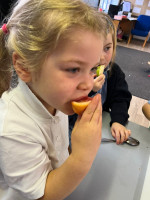 There are seven areas of learning and development that shape learning in EYFS. All areas of learning and development are important and inter-connected.
There are seven areas of learning and development that shape learning in EYFS. All areas of learning and development are important and inter-connected.
The Prime areas
- Communication and language
- Physical development
- Personal, social and emotional development
To ensure our children make good progress in the prime areas, staff meet weekly to share observations and assessments. If a need for support is identified, this is promptly provided through interactions, interventions and/or access to resources
The Specific areas
- Literacy
- Mathematics
- Understanding the world
- Expressive arts and design
How do the 7 Areas of Learning relate to the National Curriculum (Y1 - Y6)?
This table shows how the 7 Areas of Learning relate to the National Curriculum. Please note that this is a 'best fit' model as all 7 Areas are inter-related and the Prime Areas inform everything that children learn in EYFS.
| Communication & Language | PSED | Physical Development | Literacy | Mathematics | Understanding the world | Expressive Art & Design |
|---|---|---|---|---|---|---|
|
All Subjects |
PHSE |
PE |
English |
Mathematics |
Science |
Art |
|
History |
Music |
|||||
|
Computing |
Drama |
|||||
|
Geography |
Design Technology |
|||||
|
Design Technology |
||||||
You can read more about what children will be learning in each of these areas and how they can be supported here: Development Matters
Our EYFS Policy
A year in Foundation Stage
Please follow this link to see our long term plan for the year.
EYFS Progression Documents
EYFS Knowledge progression - Communication and Language
EYFS Knowledge progression - Expressive Arts and Design
EYFS Knowledge progression - Literacy
EYFS Knowledge progression - Mathematics
EYFS Knowledge progression - Personal, Social and Emotional Development
Laying the Foundations of Regulating Behaviour
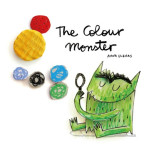 In Foundation Stage, children are taught how to recognise their emotions and are given strategies to return back to a calm and happy state. They use The Colour Monster by Anna Llenas to identify how they are feeling and know how to use breathing techniques and sensory resources to regulate their feelings and therefore behaviour. When children are struggling to self-regulate, they know to ask adults for help. The whole school behaviour policy is introduced to teach Foundation Stage children the expectations of behaviour and teach children the importance of showing excellent learning behaviours.
In Foundation Stage, children are taught how to recognise their emotions and are given strategies to return back to a calm and happy state. They use The Colour Monster by Anna Llenas to identify how they are feeling and know how to use breathing techniques and sensory resources to regulate their feelings and therefore behaviour. When children are struggling to self-regulate, they know to ask adults for help. The whole school behaviour policy is introduced to teach Foundation Stage children the expectations of behaviour and teach children the importance of showing excellent learning behaviours.
